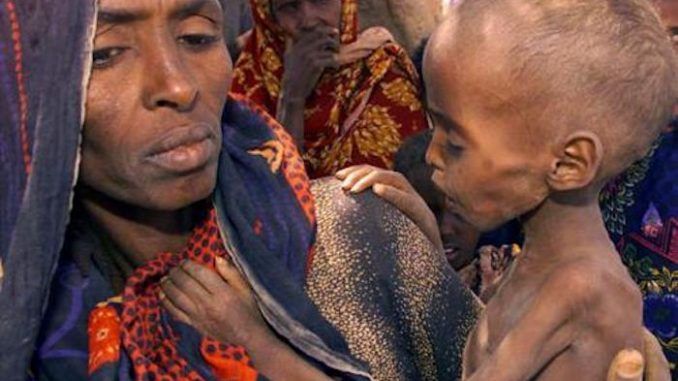
A famine seven times worse than the 1984 famine that killed one million Ethiopians will hit the country by the end of this month.
According to the Ethiopian government and humanitarian groups, Ethiopia is set to run out of food for 7.8 million people who have been hit by a severe drought.
This has left millions of Ethiopians without food and, according to international aid groups, food aid and donations are not enough to thwart the coming famine.

BYPASS THE CENSORS
Sign up to get unfiltered news delivered straight to your inbox.
You can unsubscribe any time. By subscribing you agree to our Terms of Use
Abc.net.au reports: “We are in a dire situation,” John Aylieff, the World Food Program’s representative in Ethiopia, said during a field trip to Warder in south-east Ethiopia, one of the country’s hardest-hit areas.
“We’ve got food running out nationally at the end of June. That means the 7.8 million people who are in need of humanitarian food assistance in Ethiopia will see that distribution cut abruptly at the end of June,” he added.
Along with the drought, Ethiopia also faces an outbreak of what authorities call acute watery diarrhoea, though critics have said the Government should call it cholera instead.
“I’ve never seen the resources so poor to respond to the crisis,” the country director for aid group Save the Children, John Graham, said of the drought.
“It is very worrying. These people are not going to be able to continue to survive in these dilapidated displaced people’s camps. It could get very much worse.”
Humanitarian groups fear donor fatigue is weighing on efforts to meet requirements.
Famine in north-east Nigeria, together with South Sudan, Yemen and Somalia, constitute the worst humanitarian crisis the world has faced since 1945, the UN said in March.
“There is donor fatigue because there are a lot of crises,” said Ahmed Al Meraikhi, the UN Secretary-General’s humanitarian envoy.
Addis Ababa allocated $361 million extra in 2015 and a further $145 million last year from its own coffers to deal with the drought.
However, the Government said it faced difficulties in sustaining similar targets this year.
“Last year, we spent a lot of money to confront this type of drought. It is very challenging,” said Mitiku Kassa, head of Ethiopia’s National Disaster Risk Management Commission.
Across the Horn of Africa, close to 17 million people need humanitarian aid due to drought, including 2.6 million in Kenya and 3.2 million in Somalia, according to the UN.
In the treeless plains littered with makeshift plastic homes in Ethiopia’s Warder, bordering Somalia, displaced and destitute pastoralists said their entire herds had been decimated.
“I came to this area after losing nearly all my goats and camels due to lack of rain,” 75-year-old Ader Ali Yusuf said.
The mother of 12 was just one of thousands of Ethiopians who had walked up to three days on foot to displacement camps for aid.


